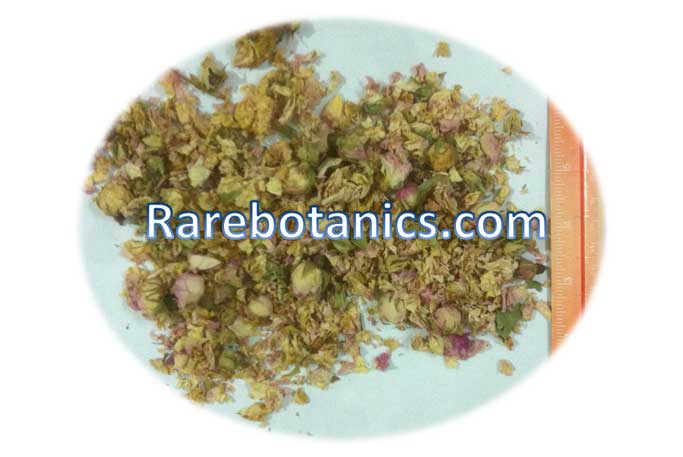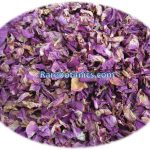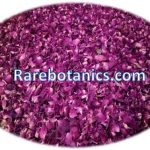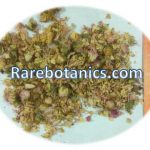Rosa damascena Dried Flowers (Gul-e-Mohammadi)
Description
Rosa damascena (Rosaceae) is commonly called Damask rose and Gul-e-Mohammadi. People called this rose the Flower of Prophet Mohammad (S.A.W) because they believe that its aroma reminds them of Prophet Mohammad (S.A.W). It is well known ornamental plant of gardens, parks, houses and streets. It is considered as the king of flowers due to its beauty, fragrance and numerous health benefits. There are over 200 rose species and 18000 cultivars. In Pakistan, the main rose cultivation regions are in Punjab and Khyber Pakhtunkhwa. Some essential oil of Rosa species are also being cultivated in Sindh Province.
Rosa damascena is a perennial shrub which reaches up to 1-2 meters in height with beautiful, showy and colourful flowers which blooms in the month of April. Its life span is up to 50 years while economic period is up to 25 years. The propagation is mostly carried out by cuttings and suckers. It is originated in the Middle East while the origin of rose water is from Iran and rose oil from Greece. This rose is cultivated in all over the world including, Iran, Turkey, Europe, India and Pakistan. They are largely cultivated for perfumery, food industry and medicine. Various products and phytochemical constituents are obtained from the plant including, flower, petals, hips and pedicle. It is widely used for preparing rose water and rose essential oils. The rose water are scattered at weddings to ensure a happy marriage and a symbol of purity. It is also used to aid prayer and meditation. Due to its low oil content and high medicinal value, this essential oil is most expensive ones in the world markets.
Plucking of Flowers of Rosa damascena
Rosa damascena flowers are plucked in early hours of the day when they just open. Plucking should be start from 4 “o” clock and continues till the afternoon. Plucking should be good if done by hand and nipped just below from the calyx. The flowers should be collected in cotton or polythene bags and then transferred to well airy wooden baskets. After collection, flowers should be processed as quickly as possible to prevent fermentation because fermented flowers lose their quality and oil content.
Dried Flowers of Rosa damascena
Dried flower’s buds and petals of Rosa damascena are sold in groceries which are used for eating, flavoring of food and as laxatives. As they are rich in vitamins, minerals, polyphenols and tannins.
Rose Water (Rosa damascena)
Rose water is an abundant product of Rosa damascena containing about 10-50% water. It is mostly used in religious ceremonies especially in mosques to calm and relax people soul. The highest quality rose water is produced for washing and spraying Khanna Kaaba in Makkah (Saudi Arabia) yearly. This water is also of great importance in food industry as it is added in various recipes.
Method of Producing Rose Water
The quality rose water depend on its mode of production. The rose water is produced by steam-distillation of fresh rose petals. Steam-distillation is used especially to purify liquids which are not very volatile and immiscible with water. The rose water produced by this method is of high quality and claims benefits.
Rose Oil (Rosa damascena)
Rose oil is volatile and obtained by distillation of fresh flowers of Rosa damascena. This oil is semi-solid and pale yellow in colour which is prepared in copper alembic stills in large factories under scientific control. Little quantity of oil is produced from large quantity of flowers i.e. about 3000 parts of flowers yields only one part of oil. Therefore, this oil is very expensive and highly liable to adulteration. This oil consists of odourlessstearoptene which contain saturated aliphatic hydrocarbons. It is true that there is no alternate of rose oil present in nature nor it can be prepared synthetically.
Methods of Producing Rose Oil
Rose oil can be extracted from Rosa damascena in three processes i.e. steam distillation, solvent extraction and carbon dioxide extraction. The most common method among them is steam distillation method. This method involves boiling of the mixture of roses and water in a large still of copper for 60-105 minutes. The vapours that evaporates from this apparatus contains rose water and oil which are collected in a condensing apparatus into a flask. The water collected in a flask receive rose water and rose oil which forms a layer above the water. This method produces about 20% of concentrated rose oil. This rose oil is also known as rose attar or rose essence.
Phytochemical constituents of Rosa damascena
The phytochemical constituents isolated from the flowers of Rosa damascena are glycosides, terpenes, flavonoids, anthocyanins, vitamin C, carboxylic acid, kaempferol, quercetin, fatty oils, organic acids and tanning matter. The rose oil contains major components including, phenyl ethyl alcohol, β-citronellol, nonadecane, geraniol, and nerol and kaempferol.
Health benefits of Rosa damascena
- Rosa damascena is used in therapeutic medicine from ancient times in the treatment of chest & abdominal pain, menstrual bleeding, digestive and heart disorders.
- The rose water is generally used as antiseptic for eye washing, mouth disinfecting, cardio-tonic and anti-spasmodic agent for abdominal pain, bronchial & chest congestions.
- The rose oil heals depression, grief, tension and nervous stress.
- This oil helps in healing wounds, thirst, cough, skin injuries, migraines and headaches.
- It is also helps to clear up acne and calm down redness & irritation of skin.
- It has antibacterial, antifungal, anti-viral and inti-inflammatory properties.






Reviews
There are no reviews yet.